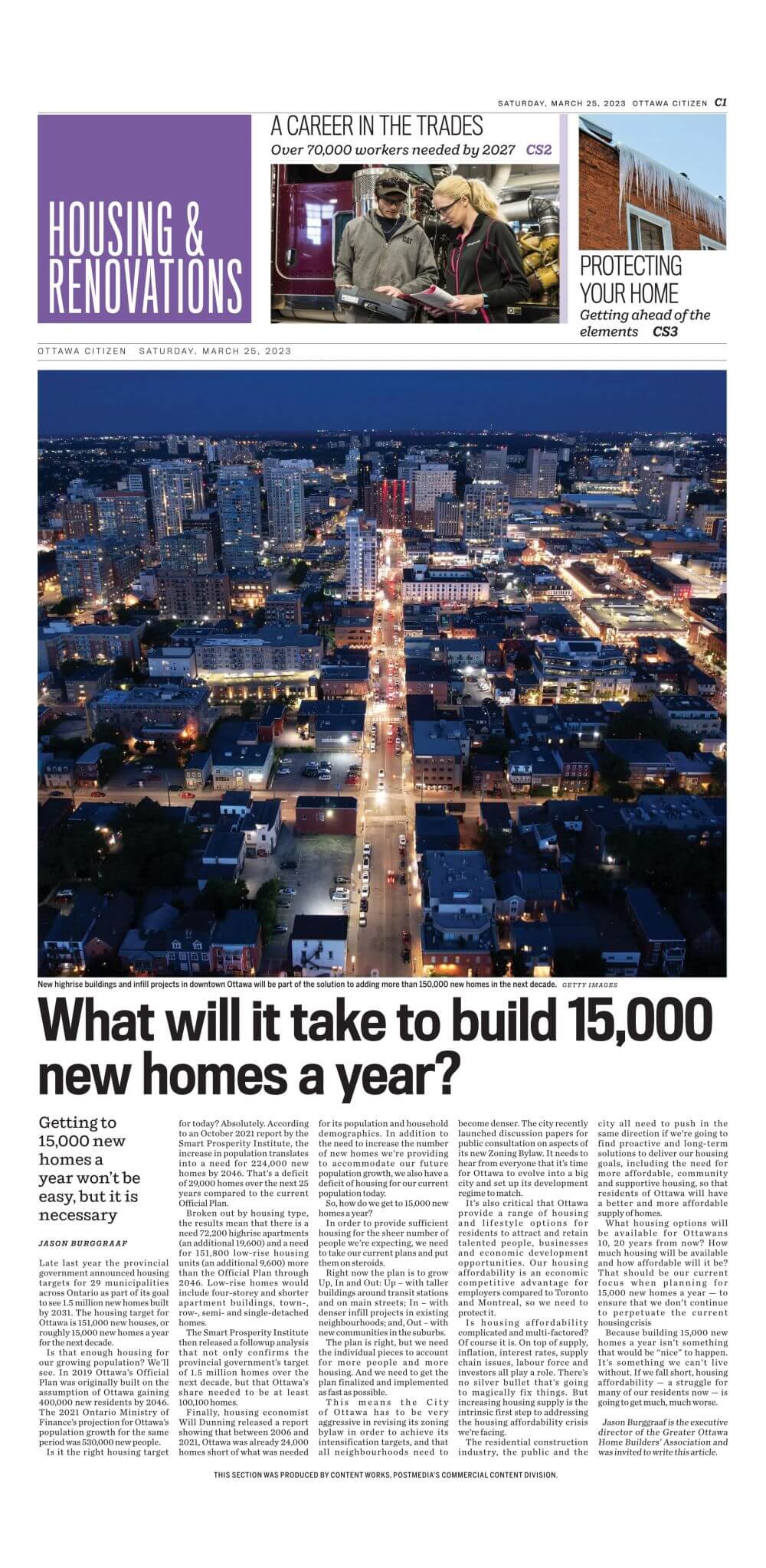What will it take to build 15,000 new homes a year?
This article was originally published in the Ottawa Citizen’s Housing and Renovations feature supplement on March 25, 2023.
Getting to 15,000 new homes a year won’t be easy, but it is necessary.
Late last year the provincial government announced housing targets for twenty-nine municipalities across Ontario as part of its goal to see 1.5 million new homes built by 2031. The housing target for Ottawa is a 151,000 new houses, or roughly 15,000 new homes a year for the next decade.
Is that enough housing for our growing population? We’ll see. In 2019 Ottawa’s Official Plan was originally built on the assumption of Ottawa gaining 400,000 new residents by 2046. The 2021 Ontario Ministry of Finance’s projection for Ottawa’s population growth for the same period was 530,000 new people.
Is it the right housing target for today? Absolutely. According to an October 2021 report by the Smart Prosperity Institute, the increase in population translates into a need for 224,000 new homes by 2046. That’s a deficit of 29,000 homes over the next 25 years compared to the current Official Plan.
Broken out by housing type, the results mean that there is a need 72,200 high-rise apartments (an additional 19,600) and a need for 151,800 low-rise housing units (an additional 9,600) more than the Official Plan through 2046. Low-rise homes would include 4-storey and shorter apartment buildings, town-, row-, semi- and single-detached homes.
The Smart Prosperity Institute then released a follow up analysis that not only confirms the provincial government’s target of 1.5 million homes over the next decade, but that Ottawa’s share needed to be at least 100,100 homes.
Finally, housing economist Will Dunning released a report showing that between 2006 and 2021, Ottawa was already 24,000 homes short of what was needed for its population and household demographics. So in addition to the need to increase the number of new homes we’re providing to accommodate our future population growth, we also have a deficit of housing for our current population today.
So, how do we get to 15,000 new homes a year?
In order to provide sufficient housing for the sheer number of people we’re expecting, we need to take our current plans and put them on steroids.
Right now the plan is to grow Up, In and Out: Up – with taller buildings around transit stations and on main streets; In – with denser infill projects in existing neighbourhoods; and, Out – with new communities in the suburbs.
So the plan is right, but we need the individual pieces to account for more people and more housing. And we need to get the plan finalized and implemented as fast as possible.
This means the City has to be very aggressive in revising its zoning bylaw in order to achieve its intensification targets, and that all neighbourhoods need to become denser. The City recently launched discussion papers for public consultation on aspects of its new Zoning Bylaw. It needs to hear from everyone that it’s time for Ottawa to evolve into a big city and set up its development regime to match.
It’s also critical that Ottawa provide a range of housing and lifestyle options for residents to attract and retain talented people, businesses, and economic development opportunities. Our housing affordability is an economic competitive advantage for employers compared to Toronto and Montreal, so we need to protect it.
Is housing affordability complicated and multi-factored? Of course it is. On top of supply, inflation, interest rates, supply chain issues, labour force and investors all play a role. There’s no silver bullet that’s going to magically fix things. But increasing housing supply is the intrinsic first step to addressing the housing affordability crisis we’re facing.
The residential construction industry, and public and the City all need to push in the same direction if we’re going to find proactive and long-term solutions to deliver our housing goals, including the need for more affordable, community and supportive housing, so that residents of Ottawa will have a better and more affordable supply of homes.
What housing options will be available for Ottawans 10, 20 years from now? How much housing will be available and how affordable will it be? That should be our current focus when planning for 15,000 new homes a year – to ensure that we don’t continue to perpetuate the current housing crisis
Because building 15,000 new homes a year isn’t something that would be “nice” to happen. It’s something we can’t live without. If we fall short, housing affordability – a struggle for many of our residents now – is going to get much, much worse.
Jason Burggraaf is the executive director of the Greater Ottawa Home Builders’ Association and was invited to write this article.

